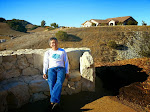Expanding the left side as the fifth power of a binomial, equating the imaginary parts on both sides of the equation, and then replacing \( \sin^2 72^\circ\) with \(1- \cos^2 72^\circ \)
\( i\sin 72^\circ \left(5 \cos^4 72^\circ+10 \cos^2 72^\circ i^2 \sin ^2 72 ^\circ+ i^4 \sin^4 72^\circ \right)=0i\)
\(16 \cos^4 72^\circ - 12 \cos^2 72^\circ + 1=0\)
Solving this quadratic in \( \cos^2 72^\circ \), we get
\[ \cos^2 72^\circ = \frac{12 \pm \sqrt{80} } {32} \]
so
\[ \cos^2 72^\circ = \frac{6 \pm 2 \sqrt{5} } {16}=\frac{\left( \sqrt{5}\pm 1 \right)^2}{4^2} \]
\[ \cos 72^\circ = \pm \frac{\sqrt{5} \pm 1}{4} \]
where we can choose the correct value of the four possible values by noting that, because 72° is between 45° and 90°, \( \cos 72^\circ \) must lie between \(1 / \sqrt{2}\) and 0. Because \( \cos 72^\circ \) is positive, we choose the "+" before the fraction, and because \( \cos 72^\circ \) is less than \( 1 / \sqrt{2}\), which in turn is less than \(\frac{\sqrt{5}+1}{4}\), we choose the "-" in the numerator:
\[ \cos 72^\circ = \frac{\sqrt{5}-1}{4} \]Constructing a regular pentagon
So we can construct \( \cos 72^\circ\). For example, the diagonal of a 1-by-2 rectangle is \(\sqrt{5}\). We could cut off one unit from a segment of length \(\sqrt{5}\), then divide the segment of length \(\sqrt{5}-1\) into four pieces of length \( \frac{\sqrt{5} -1} {4} \). (Or we could construct the appropriate solution to the equation \( 4x^2 +2x -1 = 0 \). See my post on Solving quadratic equations via geometric construction.)Construct a unit circle centered at O, and construct a radius \(\overline{OA}\). Construct the point B on \(\overline{OA}\) so that \(\overline{OB}\) has length \( \cos 72^\circ\). If C is a point on the circle so that \(\overline{BC}\) is perpendicular to \(\overline{OA}\), then \(\angle COA\) is a 72° angle, and both A and C are vertices of a regular pentagon inscribed in the circle.


1 comment:
This method of evaluating cos(2pi/5) was shown to me by my then-UCLA office mate Larry Miller in my first year of grad school.
Post a Comment